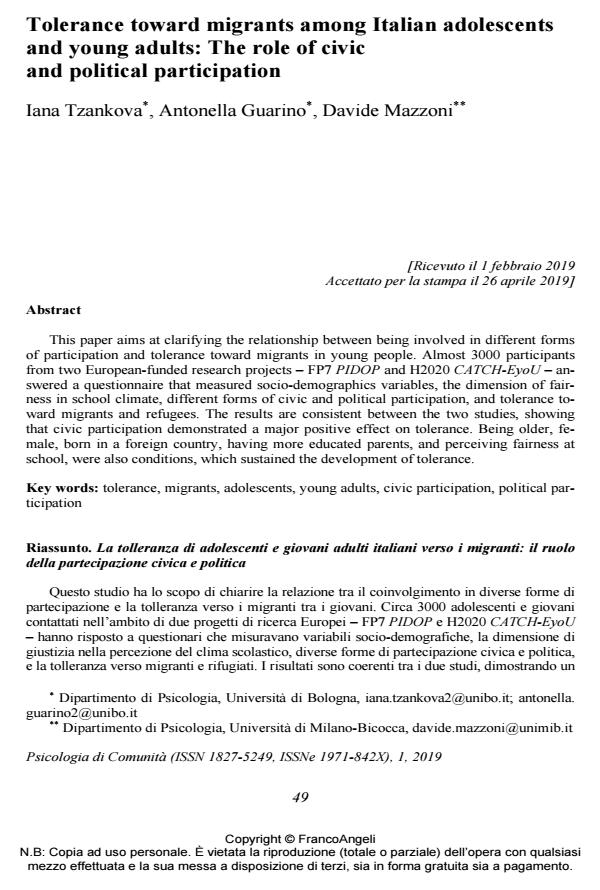Tolerance toward migrants among Italian adolescents and young adults: The role of civic and political participation
Titolo Rivista PSICOLOGIA DI COMUNITA’
Autori/Curatori Iana Tzankova, Antonella Guarino, Davide Mazzoni
Anno di pubblicazione 2019 Fascicolo 2019/1
Lingua Inglese Numero pagine 20 P. 49-68 Dimensione file 326 KB
DOI 10.3280/PSC2019-001005
Il DOI è il codice a barre della proprietà intellettuale: per saperne di più
clicca qui
Qui sotto puoi vedere in anteprima la prima pagina di questo articolo.
Se questo articolo ti interessa, lo puoi acquistare (e scaricare in formato pdf) seguendo le facili indicazioni per acquistare il download credit. Acquista Download Credits per scaricare questo Articolo in formato PDF

FrancoAngeli è membro della Publishers International Linking Association, Inc (PILA), associazione indipendente e non profit per facilitare (attraverso i servizi tecnologici implementati da CrossRef.org) l’accesso degli studiosi ai contenuti digitali nelle pubblicazioni professionali e scientifiche.
This paper aims at clarifying the relationship between being involved in different forms of participation and tolerance toward migrants in young people. Almost 3000 participants from two European-funded research projects - FP7 PIDOP and H2020 CATCH-EyoU - answered a questionnaire that measured socio-demographics variables, the dimension of fairness in school climate, different forms of civic and political participation, and tolerance toward mi-grants and refugees. The results are consistent between the two studies, showing that civic participation demonstrated a major positive effect on tolerance. Being older, female, born in a foreign country, having more educated parents, and perceiving fairness at school, were also conditions, which sustained the development of tolerance.
Questo studio ha lo scopo di chiarire la relazione tra il coinvolgimento in diverse forme di partecipazione e la tolleranza verso i migranti tra i giovani. Circa 3000 adolescenti e giovani contattati nell’ambito di due progetti di ricerca Europei - FP7 PIDOP e H2020 CATCH-EyoU - hanno risposto a questionari che misuravano variabili socio-demografiche, la dimensione di giustizia nella percezione del clima scolastico, diverse forme di partecipazione civica e politica, e la tolleranza verso migranti e rifugiati. I risultati sono coerenti tra i due studi, dimostrando un effetto positivo della partecipazione civica sulla tolleranza. Ulteriori fattori che risultano incre-mentare la tolleranza sono: avere un’età maggiore, essere donne e nate/i in un paese estero, avere genitori con livello d’istruzione più alto, e percepire un clima di giustizia a scuola.
Parole chiave:Tolleranza, migranti, adolescenti, giovani adulti, partecipazione civica, parteci-pazione politica
- Political interest, political ideology, and attitudes toward immigration Venla Hannuksela, Peter Söderlund, Marta Miklikowska, in Frontiers in Political Science 1422364/2024
DOI: 10.3389/fpos.2024.1422364 - Children and Peace Davide Mazzoni, Elvira Cicognani, Iana Tzankova, Antonella Guarino, Cinzia Albanesi, Bruna Zani, pp.89 (ISBN:978-3-030-22175-1)
Iana Tzankova, Antonella Guarino, Davide Mazzoni, Tolerance toward migrants among Italian adolescents and young adults: The role of civic and political participation in "PSICOLOGIA DI COMUNITA’" 1/2019, pp 49-68, DOI: 10.3280/PSC2019-001005